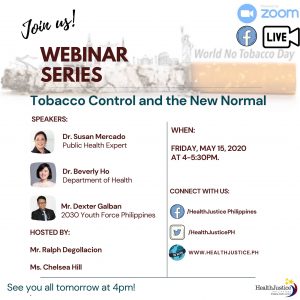Health experts recommend that public spaces should be 100% smoke-free in order to protect public health.
In a webinar organized by HealthJustice Philippines last May 15, 2020, health and tobacco control advocates and experts are in agreement that “having a 100% smoke-free environment in both public and private spaces should be the better normal.”
The said webinar, which was moderated by Ralph Emerson Degollacion of HealthJustice and Chelsea Hill of Social Watch Philippines Youth, featured Dr. Susan Mercado, a public health expert who previously served as the Director of Non-communicable Diseases and Health through the Life‑Course at the World Health Organization Western Pacific Region; Dr. Beverly Ho, Health Promotion and Communication Service Director and Special Assistant to the Secretary of Health at the Department of Health; and Dexter Galban, Health Ambassador of the 2030 Youth Force in the Philippines. Dr. Daniel Tan, Board Member of HealthJustice, gave the opening remarks.

Dr. Mercado pointed out that the time is ripe for 100% smoke-free policies.
“There’s no point in time in recent history where people have become more concerned about health. This is a moment when we’re all now very aware about our health and how our own health impacts on other people. We can really push for 100% smoke-free areas. It should be 100% smoke-free not just in homes, but in areas where people are,” Dr. Mercado said.
“Blowing off secondhand smoke, indoor smoke, third-hand smoke— that’s not acceptable anymore because you are affecting other people. Smoking [should] be completely banned, even outdoors. There will be no more designated smoking areas.” Dr. Mercado emphasized.
Dr. Mercado, who is now working as a health consultant for a private company, said that “One of the things that we can do [to establish] fitness to work, is [to ask smokers to quit] because of one of the criteria for not allowing workers to come back is comorbidity, which can be a lung or heart disease [that may worsen] if one is still smoking.”
“Half of the people who want to quit smoking will be able to quit without help and by offering help, we can increase that number,” Dr. Mercado remarked.
Dr. Ho, on the other hand, recommended health advocates and workers to seize opportunities during this pandemic to up the ante on smoking cessation efforts.
“There is a strong opening for telemedicine and teleconsultation. This provides us a very good platform to scale up cessation services. Also, [there’s] increasing awareness and support to do teleconsultation specific for mental health; we should push [smoking cessation services] together with it because a lot of people cite that they go back to smoking or drinking because of the stress brought out by ECQ,” Dr. Ho advised.
Dexter Galban, a youth leader and advocate for public health, highlighted the role of the youth during this time.
“When the pandemic first came into light, we saw a blitzkrieg of publication materials by done by a lot of youth groups, particularly addressing the signs and symptoms of Covid-19, how they can volunteer, and how they can help,” Galban observed.
Galban encouraged workers in the public health sector to continue involving the youth in their programs.
“We are open for collaborations and partnerships so we can capitalize on this small window where the young people are very active and have put their attention particularly to health,” Galban said.
For Dr. Tan, all kinds of smoking habits must end.
“The goal is the complete cessation. All combustible products [and all nicotine delivery products] It’s not even approved by the FDA. We doctors should be encouraged to be prepared to be aware of the issue and discuss it,” Dr. Tan said.
“The reality is many Covid-19 patients may have concurrent chronic lung disease and are still unaware of it. Majority have a higher risk of dying simply because katakut-takot na ‘yung Covid-19 disease sa baga pero bago pa magkasakit, abnormal na ‘yung baga,” added Dr. Tan.
Engr. Emer Rojas of the New Vois Association of the Philippines and Ms. Aurora Quilala of the Philippine Legislators’ Committee on Population and Development also joined the discussion.
The webinar entitled “Tobacco Control and the New Normal” is part of the World No Tobacco Day 2020 activities of HealthJustice.
HealthJustice is a Bloomberg Awardee for Global Tobacco Control. It is part of NCD Alliance, an international network of civil society organizations, scientific and professional associations and academic and research aiming to reduce the burden of non-communicable diseases.